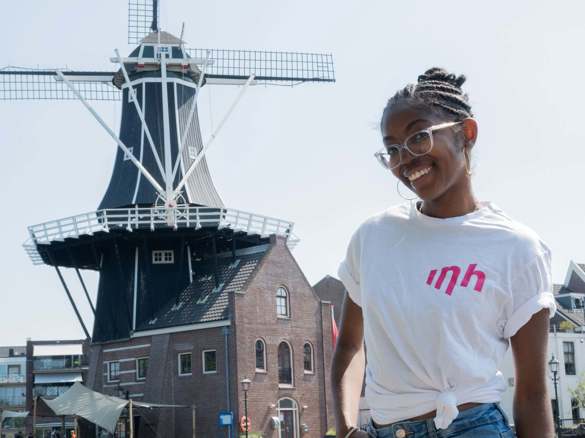

Moving abroad to live in the Netherlands is an exciting adventure — a chance to discover a new culture, meet people from all over the world, and experience life from a fresh perspective. At the same time, we know it can feel a little daunting, especially at the start.
To help you settle in, we've gathered some basic information about Dutch culture, daily habits, safety, and language, as well as what to expect when studying here.
The Netherlands is the perfect place to learn, grow and connect with people from all over the world. Every year, more than 100,000 international students choose to study here — and it’s easy to see why:
Top-quality education
Classes are interactive and student-centred, with hands-on projects, group work and plenty of room to share your ideas.
International and inclusive
Join a diverse student community in one of Europe’s most international, English-friendly countries.
Safe and easy to settle in
The Netherlands is safe, welcoming and easy to navigate — you’ll feel at home in no time.
Enjoyable lifestyle
It’s easy to get around on foot or by bike, and enjoy a lively café culture and plenty of green spaces.
Great location in Europe
From the Netherlands, it’s easy to travel to nearby countries and explore even more cultures.

Want to know what living in the Netherlands is really like? Ask one of our students! They are happy to share their experiences — from finding housing and getting around, to Dutch culture, daily habits and making friends.
Start a chat with a student
Amsterdam is the capital of the Netherlands, but the government is based in The Hague.
Nearly half of the Dutch population lives in the Randstad — the urban area that includes Amsterdam, The Hague, Rotterdam and Utrecht.
There are around 23 million bikes in the Netherlands. That’s more than the country’s 18 million residents!
The Netherlands ranks amongst the world’s best countries for business, thanks to its strong economy and international outlook.
The Netherlands is home to many global firms, including Philips, Shell, Heineken, KPMG and Unilever.
Around 26% of the Netherlands lies below sea level, with the lowest point being 6.7 meters below sea level.
Dutch is the official language, but almost everyone speaks English.
The Netherlands is a great choice for an international degree. With its lively cities, rich culture and welcoming atmosphere, there’s always something to see, do and experience.
Thanks to its long history of trade and openness to the world, the Netherlands is one of Europe’s most multicultural and innovative countries. You’ll see that entrepreneurial spirit everywhere — in the people you meet, the creative energy in the cities, and the way we teach.
That mindset also shapes our programmes: practical, hands-on and designed to prepare you for an international career.
Finding a place to live in the Netherlands can be challenging. The housing market is tight, with rising prices and limited affordable options, especially in bigger cities. But don’t worry: there are two main ways to find a room as a student.
Student housing via Inholland
Inholland University of Applied Sciences offers a limited number of furnished rooms for international students, close to campus. Availability is limited, so be sure to check the options for your future campus to see what’s possible and how to apply.
Housing via the private market
The private market gives you more choice in room types and locations. But since it’s open to everyone, it can be competitive, so it’s smart to start your search early and keep an open mind about different options.
In the Netherlands, it’s easy to get around — even without a car. The public transport network and bike paths reach almost every corner of the country. Train and bus fares aren’t cheap, but they’re still much more affordable than owning a car.
The Dutch love to bike, and you will too! In the Netherlands, cycling is a way of life, and it’s the easiest, cheapest and most fun way to get around as a student.
Everyone cycles
People of all ages and backgrounds cycle everywhere: to work, school, the shops and even parliament.
Affordable options
A new bike costs around €450, but second-hand bikes are much cheaper and easy to find.
Don’t overspend
Bike theft is common in the Netherlands, so don’t buy an expensive bike. Instead, invest in a heavy chain and a good lock to keep it safe.
The Netherlands has an excellent public transport system; it is reliable, frequent and easy to use. Whether you’re travelling between cities or just getting around your neighbourhood, trains, buses, and trams can take you almost anywhere.
Fast and frequent
Trains between major cities run 4–6 times an hour. Buses and trams make local travel simple and convenient.
Use an OV-chipkaart
Single tickets are available, but most students use an OV-chipkaart, a smart card you can use on all public transport in the Netherlands.
Plan your journey online
Use 9292.nl for all public transport routes and times, or ns.nl for train journeys.
The Dutch love their holidays, and you’ll soon get swept up in the celebrations too. Here are some of the biggest and most memorable Dutch traditions to look out for:
King's Day (Koningsdag)
On 27 April, the Dutch celebrate King Willem-Alexander’s birthday in a truly unique way: the whole country turns into one big flea market, with music and festivals everywhere. Everyone wears orange, the national colour, so put on something orange, enjoy Dutch treats, and join the celebrations.
Remembrance Day and Liberation Day
On 4 May, the Dutch remember victims of the Second World War with a two-minute silence at 20:00. In cities and towns, people pause to observe the silence, and flags are flown at half-mast throughout the day.
The next day, 5 May, the mood shifts to celebration as the country marks its liberation from German occupation in 1945. Flags are raised, and cities host festivals and concerts.
Sinterklaas
Sinterklaas is a beloved Dutch tradition celebrated on 5 December, where children receive small gifts and sweets. Despite the initial similarities with Santa Claus, Sinterklaas lives in Spain, travels by steamboat and rides a white horse.
On the evening of 5 December, families gather to exchange bigger presents, often brought in a sack, along with playful poems and surprises.
Christmas and New Year's Eve
Christmas in the Netherlands is cosy and family-focused, celebrated over two days, the 25 and 26 December.
New Year’s Eve, on the other hand, is loud and lively. Families and friends come together to eat oliebollen (deep-fried dough balls) and toast the new year. As the clock strikes twelve, the whole country lights up with fireworks, set off by locals themselves. It’s a unique and unforgettable way to welcome the new year.
If you’re staying in the Netherlands, you must have valid health insurance for the entire duration of your stay. We also strongly recommend taking out liability insurance as it’s affordable and covers you in case you accidentally cause damage or injury.
Students from EU/EEA countries
If you’re from an EU or EEA member state, you can usually use your European Health Insurance Card (EHIC) for medical care in the Netherlands. Make sure to apply for the card through your own insurance company before you arrive.
We also recommend getting additional travel and liability insurance, as the EHIC does not cover everything.
Students from non-EU/EEA countries
If you’re from outside the EU/EEA, you will need to take out an AON student insurance. If Inholland is arranging your visa, the Admissions Office will also arrange the AON insurance for you. You’ll receive a copy of the insurance certificate by email; you’ll need this when applying for your visa.
If you have a non-EU nationality but are studying at an EU university and already have an EHIC, you may not need the AON insurance. Please check with admissions@inholland.nl to confirm.
If you work part-time
If you take on a part-time job in the Netherlands, you’re required to take out Dutch basic health insurance, even if you already have other coverage. For advice on this, contact the International Office at your campus.
Still have a few questions? We’ve put together a list of frequently asked questions (and answers) about living in the Netherlands.
If you’re living and studying in a major Dutch city like Amsterdam, Rotterdam, The Hague, or Utrecht, you can expect to spend around €1,000 to €1,400 per month.
This estimate covers essentials like rent, food, insurance, study materials, and other daily costs, but it doesn’t include tuition fees or travel expenses.
It’s true, about a quarter of the Netherlands lies below sea level. But you don’t need to worry about flooding. The Dutch are world-famous for their water management and have built an incredible system of dykes, dams and pumps to keep the country safe and dry.
Dutch weather can be unpredictable, so it’s best to come prepared. Winters are mild, but it can feel quite cold because of the wind. Summers are usually mild and pleasant, with plenty of sunny days to enjoy being outdoors. Rain is common all year round, so bring a good raincoat, dress in layers, and pack a warm coat for the colder months.
Most people in the Netherlands pay by card, even for small amounts. Many shops, cafés, and supermarkets don’t accept cash at all. You won’t need much cash, but it’s handy to carry a little just in case.
